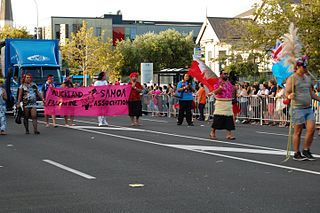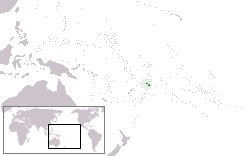Māhū in Native Hawaiian and Tahitian cultures are third gender people with traditional spiritual and social roles within the culture, similar to Tongan fakaleiti and Samoan fa'afafine. Historically the term māhū referred to people assigned male at birth (AMAB), but in modern usage māhū can refer to a variety of genders and sexual orientations.

Faʻafafine are people who identify themselves as having a third gender or non-binary role in Samoa, American Samoa and the Samoan diaspora. A recognised gender identity/gender role in traditional Samoan society, and an integral part of Samoan culture, faʻafafine are observed male at birth, and explicitly embody both masculine and feminine gender traits in a way unique to Polynesia. Their behaviour typically ranges from extravagantly feminine to conventionally masculine.

Oceania is, like other regions, quite diverse in its laws regarding homosexuality. This ranges from significant rights granted to the LGBT community in New Zealand, Australia, Guam, Hawaii, Easter Island, Northern Mariana Islands, Wallis and Futuna, New Caledonia, French Polynesia and Pitcairn Islands to remaining criminal penalties for homosexual activity in 6 countries and one territory. Although acceptance is growing across the Pacific, violence and social stigma remain issues for LGBTI communities. This also leads to problems with healthcare, including access to HIV treatment in countries such as Papua New Guinea and the Solomon Islands where homosexuality is criminalised.

Lesbian, gay, bisexual, and transgender (LGBT) persons in Niue face legal challenges not experienced by non-LGBT residents. Male same-sex sexual activity is illegal in Niue, although there is no recent instance of it being actively prosecuted. Same-sex couples and households headed by same-sex couples are not eligible for the same legal protections available to opposite-sex married couples.

Lesbian, gay, bisexual, and transgender (LGBT) persons in Tokelau face legal challenges not experienced by non-LGBT residents. Both male and female same-sex sexual activity are legal in Tokelau, but same-sex couples and households headed by same-sex couples are not eligible for the same legal protections available to opposite-sex married couples.

Lesbian, gay, bisexual, transgender (LGBT) people in American Samoa face legal challenges not experienced by non-LGBT residents. Same-sex sexual activity became legal in the territory in 1980, but same-sex couples may not marry. Same-sex couples married legally in other jurisdictions are recognized and must be treated equally under US federal law since 13 December 2022. American Samoa remains the only part of the United States along with select Native American tribal jurisdictions to enforce a ban on same-sex couples marrying.

Lesbian, gay, bisexual and transgender (LGBT) people in Samoa face legal challenges not faced by non-LGBT people. Same-sex sexual acts are illegal, punishable by up to seven years imprisonment, but the law is not enforced.
Fuimaono Karl Pulotu-Endemann is a Samoan-born, New Zealand-based academic, nurse and fa'afafine and is called by Te Ara: The Encyclopedia of New Zealand "one of New Zealand's best-known and most honoured fa'afafine".

Miss Major Griffin-Gracy, often referred to as Miss Major, is an American author, activist, and community organizer for transgender rights. She has participated in activism and community organizing for a range of causes, and served as the first executive director for the Transgender Gender Variant Intersex Justice Project.
Mele Fakatali Nemaia is a community organiser and educator of Niuean descent.
The Arts Pasifika Awards celebrate excellence in Pacific arts in New Zealand. The annual awards are administered by Creative New Zealand and are the only national awards for Pasifika artists across all artforms.

Lorena Borjas was a Mexican-American transgender and immigrant rights activist, known as the mother of the transgender Latinx community in Queens, New York. Her work on behalf of immigrant and transgender communities garnered recognition throughout New York City and the United States. She lived for many years in the Jackson Heights neighborhood of Queens, where she was a community figure and leader.
Amao Leota Lu is a Samoan fa’afafine, who is a performance artist, poet and community activist.

Toʻotoʻoaliʻi Roger Stanley (1976–2018) was a Samoan faʻafafine activist, who was President of the Samoa Faʻafafine Association from its foundation in 2006 to her death.
Fakafifine are people from Niue, who were born assigned male at birth but who have a feminine gender expression. In Niue this is understood as a third gender, culturally specific to the country.
Vakasalewalewa are people from Fiji, who were assigned male at birth but who have a feminine gender expression. In Fiji this is understood as a traditional third gender identity, culturally specific to the country.

FAFSWAG is an arts collective of Māori and Pacific LGBTQI+ artists and activists founded in Auckland, New Zealand in 2013. They explore and celebrate the unique identity of gender fluid Pacific people and LGBTQI+ communities in multi-disciplinary art forms. In 2020 FAFSWAG was awarded an Arts Laureate from the New Zealand Arts Foundation, and they also represented New Zealand at the Biennale of Sydney.

Amanaki Lelei Prescott-Faletau is an actor, writer, dancer, choreographer, producer and director of Tongan descent, living in New Zealand. As a playwright, she became the first fakaleitī to have her work published in New Zealand with Inky Pinky Ponky. This play was awarded Best Teenage Script (2015) by New Zealand Playmarket. As an actor, she was awarded best performance at the 2015 Auckland Fringe Festival for Victor Rodger's Girl on the Corner. Her acting credits include The Breaker Upperers (2018), SIS (2020), The Panthers (2021), The Pact (2021) and Sui Generis (2022), in which she is also a writer for the TV series. Faletau competed as a dancer in the World Hip Hop Dance Championships in 2011 and has been a judge at the National Hip Hop Championships in New Zealand over several years.
Tuisina Ymania Brown-Gabriel, better known as Ymania Brown, is a Samoan LGBT rights activist and lawyer based in Brisbane, Australia.

Dana de Milo was an activist and outspoken community member from Aotearoa/New Zealand. She engaged with issues faced by the queer community, and transgender people in particular. She was a transgender woman herself.












